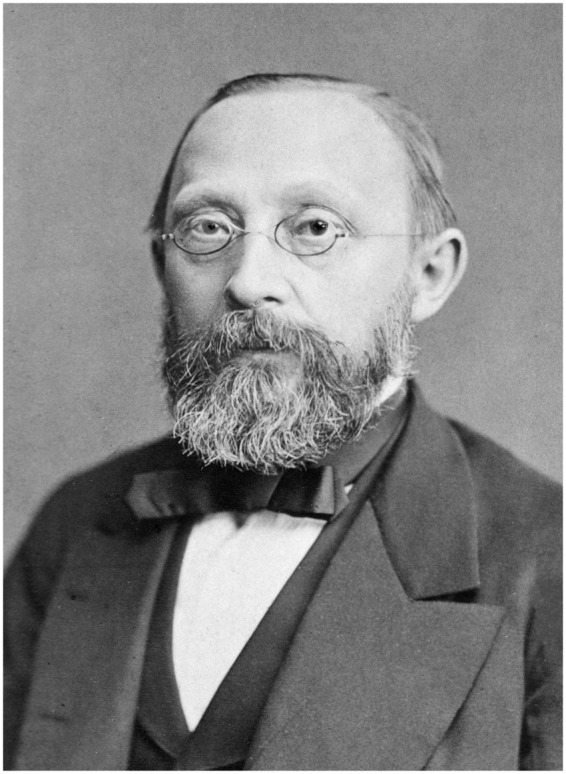Early life
Virchow was born in Poland, and despite humble beginnings from a working class family, he excelled at school, becoming fluent in six languages. Virchow gave up his original plan of theology partly on account of his weak voice which he felt would prevent him being heard from the pulpit, and partly, it would seem, because he was agnostic.
Medical work
After graduating from Friedrich-Wilhelms University in Berlin in 1843, his major work was in pathology, becoming its professor in Pathological Anatomy and Physiology in 1854. He developed an interest in microscopy. His first scientific paper was two years after graduating, on the pathological description of leukaemia, a term he invented. On the back of the recent discovery by Theodor Swann that all animals are composed of cells, he became convinced of their importance, declaring: “The body is a cell state in which every cell is a citizen. Disease is merely the conflict of the citizens of the state brought about by the action of external forces,” and that “every cell arises from another cell.”
Virchow was the first to correctly link the origin of cancers from otherwise normal cells, believing that cancer is caused by severe irritation in the tissues (the ‘chronic irritation theory’). Not all of his work was correct, however. He also proposed that cancer spreads around the body by the spread of the irritation in liquid form. And his diagnosis of benign laryngeal ulceration in the German Emperor, Kaiser Friedrich III, prevented the emperor undergoing surgery, who then subsequently died of metastatic laryngeal squamous cell carcinoma. Virchow was accused of malpractice; however, recent reassessment suggests that he was at least partly correct.
Virchow was the first to develop a system of autopsy, and an autopsy instrument, for exposing the brain, both still in use today. He was the first to use hair analysis in a criminal investigation, and was the first to describe and name a number of terms, including parenchyma, spina bifida, and vertebral disc rupture, as a result of his work. Virchow’s node, an enlarged left supraclavicular node, is often a sign of gastrointestinal or lung malignancy.
Virchow was also wrong in his disbelief of Pasteur’s germ theory of diseases, proposing instead that “germs seek their natural habitat: diseased tissue, rather than being the cause of diseased tissue.” He thought that social factors such as poverty were the major cause of diseases, and that as epidemics were social in origin, the way to combat epidemics was political, not medical.
His pathological studies led to further understanding of the mechanism behind venous clot formation, defining his eponymous triad, and the words thrombosis and emboli. He observed: “The detachment of larger or smaller fragments from the end of the softening thrombus which are carried along by the current of blood and driven into remote vessels. This gives rise to the very frequent process on which I have bestowed the name of Embolia.”
Other careers
In addition to his scientific work, he became editor of several medical journals, and held careers as a politician and anthropologist. He was concerned about the spread of disease, working to improve water and sewage systems, and being credited as the founder of social medicine along the way. His work on the lifecycle of the roundworm Trichinella spiralis and that cooking meat adequately prevented spread to humans led to the importance of meat inspections, first adopted in Berlin.
Virchow had liberal political views, promoting better education, living conditions, and health for the poor. Virchow was a founding member of the German liberal party and was opposed to the excessive military budget of Bismarck, the conservative Prussian chancellor. This angered Bismarck sufficiently to challenge Virchow to a duel in 1865. One version of this story is that Virchow received notification of the duel whilst in his laboratory working on a cure for trichonella which at the time was widespread in Germany. As the challenged party, Virchow was entitled to the choice of weapons. He selected two externally identical cooked sausages one of which was edible and the other filled with deadly trichinae. Bismarck refused to accept the duel and Virchow’s honour remained intact; a case of Bismarck fearing the wurst.
Virchow developed an interest in anthropology after he and his sons discovered an ancient settlement of dwellings on an island off the coast in northern Germany, and went on to co-found the German Anthropological Association and the Society for Anthropology, Ethnology and Prehistory, becoming the journal’s editor and conducting field trips around the world. He was an opponent of Darwin's theory of evolution, judging him an “ignoramus” and declaring that “it is quite certain that man did not descend from the apes”. He became one of the leading opponents on the debate over the authenticity of Neanderthal, convinced that it was a species distinct to modern humans.
Death
Virchow fractured his femur on 4 January 1902 from jumping off an electric tram. Although he anticipated full recovery, the fractured femur never healed, and restricted his physical activity. His health gradually deteriorated as a result, and he died of heart failure eight months later, leaving a wife, three sons and three daughters.

Declaration of conflicting interests
The author(s) declared no potential conflicts of interest with respect to the research, authorship, and/or publication of this article.
Funding
The author(s) received no financial support for the research, authorship, and/or publication of this article.


